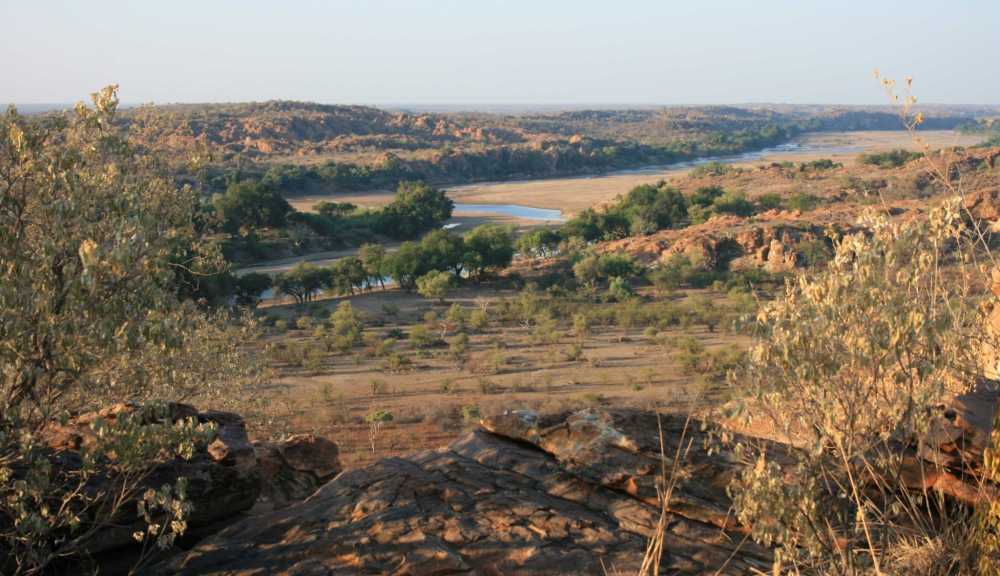Located in the extreme north of the country in the Vhembe region, the Mapungubwe national Park is rich in culture, history and wildlife and is a UNESCO World heritage Site.
He has witnessed many civilisations, from Stone Age hunter-gatherers to the Leopard's Kopje people in the years 1000 to 1300. The Leopard's Kopje people lived around Mapungubwe Hill and created the first indigenous kingdom in southern Africa. The kingdom flourished thanks to the trade in gold and ivory sold in exchange for pearls and ceramics with several countries in the Indian Ocean. Then climate change led to the decline of the kingdom. Many remains have been found including the famous Golden Rhino that you can admire at the "Mapungubwe Interpretation Centre".
The park is home to some of the most endangered mammals on the planet: the black rhinoceros, the wild dog, the cheetah, the brown hyena and the elephant. You can also see giraffes, antelopes, lions, leopards and many birds.
In the background, you will discover huge plains of baobabs, riparian forests, mopane woods, and sandstone formations. Stop at the picnic area to enjoy the view of the Limpopo River and the Shashe River bordering South Africa, Botswana and Zimbabwe! Several sites of rock paintings (rock art) drawn by the San and their ancestors can also be observed.
The most northerly province of South Africa, it borders Mozambique, Zimbabwe and Botswana. Its name comes from the Limpopo River that runs along its northern border.
Limpopo is a destination rich in wild animals, spectacular landscapes and nature reserves. In addition to safaris and bird watching, the province is the cradle of ancient cultures, such as the Venda culture, steeped in myth and legend.
Advice:
- Makapan's Valley and "The Cave of Hearths" in Mokopane, a UNESCO World Heritage site
- Visit the Rhino Museum in Vaalwater, the only rhinoceros museum in Africa, devoted entirely to the conservation of this endangered animal
- The Magoebaskloof Spring Fair, in September, to visit gardens, discover orchids and wander amidst craft markets
- Mystic Monkeys Feathers Wildlife Park at Rust de Winter, near Bela-Bela
- Adventures with Elephants in Bela-Bela
South Africa, the 'rainbow' nation.
South Africa is so diverse you feel like you are visiting several countries in one trip!
With grandiose and various landscapes (mountains, « bush », beaches, forests, plains, desert), a pleasant climate in all seasons, an abundant and diversified fauna and flora including the “Big Five”, a population with the most composite ethnic groups, South Africa accumulates important natural wealth. Also note among its assets: quality of the hotel sector, services, road network, means of transport, rich and varied gastronomy, excellent wines, favourable exchange rates, 21 national parks and many private reserves, a multitude of activity throughout the country…
When to go?
South Africa has this peculiarity of presenting a wide variety of climates: Mediterranean, subtropical or temperate depending on the region with a high rate of sunshine everywhere (watch out for sunburn!)
South Africa can be visited all year round with more favourable periods depending on interests:
-
June, July and August (South African winter) for animals and therefore preferably the North of the country.
-
September and October: best times for flowers (Namaqualand) but very good for game drives as well.
-
From November to March (South African summer): best time to enjoy the South and East of the country, beaches of the Cape and the Indian Ocean. The Garden Route is particularly appreciated in February: the weather is nice; the temperature of the water is pleasant.
-
April and May: very pleasant autumn with always nice days in Cape Town and the resumption of the animal season.
Formalities:
The passport must include two blank pages and still be valid for 30 days after the expected date of exit from South Africa.
French nationals are exempted from prior visas. A 90-day residence permit will be issued at the border on entry into South African territory.
For other nationalities, inquire on a case-by-case basis with the competent authorities of their country of origin.
For any minor child: a multilingual extract of birth certificate (or an unabridged birth certificate translated into English - certified translation) is required to enter and leave South Africa (in the case of a child traveling with his 2 parents). Please consult the official sites for more information about all the requested documents according to your case.
Health:
No vaccinations are required for entry into South Africa. However, it is advisable to check the updating of your usual reminders and vaccinations as for any country.
Anti-malarial treatment is recommended (see your doctor).
Currency:
The Rand is the official currency of South Africa (symbol: ZAR). Credit cards are accepted everywhere and distributors are easily available for cash withdrawal. Travellers’ checks in euros are also accepted in banks and some hotels.
